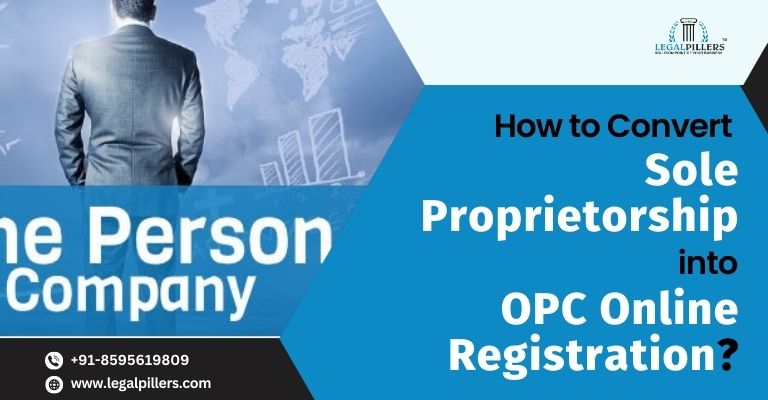
Are you a sole proprietor & want to expand your business? So, converting from a sole proprietorship into an OPC Online Registration is the right decision for you. This conversion offers limited liability and will be very beneficial for the solo entrepreneurs. The transformation from proprietorship into OPC will help you in enhancing the credibility of your business and also provide better legal protection as well as easy access to funds. In simple words, we can say that one person company registration is an improved & better form of a sole proprietorship. So converting your proprietorship into OPC registration is a good & strategic business decision for the success of your company. You can convert your proprietor into OPC as per the Companies Act 2013. Here, in this blog we will discuss everything about the transformation of Sole proprietorship into One Person company registration online.
Before moving ahead with the conversion let’s have a quick glimpse on Sole Proprietorship & OPC Registration in India-
Table of Contents
Sole Proprietorship
A sole proprietorship is a business that has been owned & managed by a single individual. It is the easiest and simplest form of the business. You can run your business as sole proprietor by your legal name and may be by a different trade name after registering it with local authorities. If someone wants to establish the business, it is the easiest type as there is the lack of government regulations for sole proprietorship. It has the unlimited liability i.e. sole proprietor is individually authorized for all the profits and also responsible for the losses & debts of the company. A sole proprietorship begins and ends with the decision of the sole proprietor or after his/her death.
OPC Online Registration
OPC registration is also known as Single Person Company Registration. It is best for the solo entrepreneurs. It has been established and managed by a single person. Basically, OPC is a type of Private Limited Company with same features. It has been registered under the Companies Act 2013. OPC Registration online combines the benefits of Private Limited company as well as the simplicity of sole proprietorship. OPC Registration includes the benefits of limited liability as well as separate legal entity.
Key requirements for the conversion of Sole Proprietorship into OPC Online Registration
If you want to convert your sole proprietorship into one person company registration, you should have to know about its basic requirements as per the Companies Act 2013. If you did not fulfill any of the requirements then you will not be able to transform your proprietorship. So before anything else, just have a look on these conditions which are as given below-
- Single Member
You can complete a one person company registration with just one single member. There is the requirement of only one director. The member & director can be a same person but they can’t be the member of any other OPC.
- Indian Resident
The member of an OPC should be a natural person and must be the resident of India.
- Individual Director
A One Person Company has only one director. Only individuals can be designated directors. After conversion the sole proprietor will be the director of a one person company registration.
- Company Name
The name of the one person company registration online should be unique and should not be similar to the name of any existing company or trademark. As per the naming guidelines, the name of a one person company should be end with “(OPC) Private Limited”.
- Minimum Capital
There will be no requirement of any minimum capital in order to OPC Registration.
- Nominee
For the conversion of your sole proprietorship into an OPC Registration in India, you must have to appoint a person as the nominee. That person should be an Indian citizen.
These are the key requirements that you should remember while converting your sole proprietorship into an OPC Registration online. You must have to fulfill these requirements for a successful transformation.
Benefits of Converting Sole Proprietorship into OPC Online Registration
If you have decided to go ahead with the conversion of your sole proprietorship into OPC Registration in India, it will prove to be very beneficial for you. This transformation offers you a number of benefits. It will have a great impact on the operations of your business. In this section of the blog, we will discuss about the advantages of this conversion. Here are the key benefits-
- Limited liability
In sole proprietorship, there is unlimited liability i.e. the owner individually liable for all the losses & debts while in one person company, the liability of the shareholder is limited to their investment reducing financial risk.
- Separate legal entity
One Person company has a separate legal entity from its owner. It will offer the more credibility & legal protection. However, the sole proprietorship does not have the separate legal entity.
- Perpetual Existence
The one person company has a perpetual succession i.e. continuous existence for law even after the death/retirement of the owner or in case of bankruptcy. In such cases the OPC will be taken over by the nominee. However, in case of sole proprietorship the company does not exist after the death of the proprietor.
- Easy access to capital & funding
Single person company registration can access the capital & fund easily for the expansion and can attract the investors.
- Taxation
A One Person company has to pay the tax on the basis of its profit while a sole proprietor has to pay the tax according to his/ her income.
Process of Converting Sole Proprietorship into OPC Online Registration
It includes a number of simple but strategic steps to convert Sole Proprietorship into OPC Registration in India. You just need to understand this process properly. You can also seek the guidance of expert professionals for a hassle free transformation. Here is the straightforward process-
-
Step 1: Obtain DSC
The sole proprietor must have to acquire their DSC i.e. Digital Signature Certificate for one person company registration online. DSC has been required for online filing & verification of documents.
-
Step 2: Application for availability of the name of the company
Sole proprietor must have to apply for the availability of the name of the company via SPICe+ form. The owner has to make sure that the proposed name of the company should be according to the naming guidelines of the MCA i.e. Ministry of Corporate Affairs.
-
Step 3: Drafting of MOA & AOA
The proprietor must have to prepare the MOA i.e. Memorandum of Association & AOA i.e. Articles of Association of the new OPC Registration online. These crucial documents consist of the rules, regulations, and objectives of the company.
-
Step 4: Application for OPC registration
After that, you must have to apply for the registration of the one person company and submit it along with all the required documents on the portal of MCA i.e. Ministry of Corporate Affairs.
-
Step 4: Certificate of incorporation
Then, after the successful submission of application form and documents, RCO i.e. Registrar of Companies verify your application and will issue the certificate of incorporation.
-
Step 5: Application for PAN and TAN
After the successful incorporation, you must have to apply for the new PAN and TAN for the newly formed one person company.
These are the simple & straightforward steps include in the process of transforming a sole proprietorship into an OPC Registration in India. You need to follow these steps carefully for a hassle free conversion.
Essential Documents Required for Converting Sole Proprietorship into OPC Online Registration
- PAN Card & Aadhaar Card as identity proof of the individual who will be the sole director of the OPC & nominee
- Recent passport size photographs of director & nominee
- Consent of nominee (INC 3)
- Address proof of director & nominee (documents like Aadhaar Card, Passport, or utility bills that display residential address)
- Proof of the ownership of business place (if business place is owned by the sole proprietor)
- Lease/ Rent agreement between sole proprietor and the owner of the property (if the business place is rented)
- NOC i.e. No Objection Certificate from the landlord (if the business place is owned by someone other than the sole proprietor)
- Recent utility bills (electricity bill, water bill, etc.) for the address proof of business place.
Post-Conversion Compliance Requirements
Your word did not end at the conversion. You will have to take care of the post conversion compliance requirements in order to stay legally on the right track. Here are the key compliance requirements-
- Annual Filing: You have to file the annual financial & returns with the ROC i.e. Registrar of Companies.
- Filing Income Tax Return: The most important thing for every company is to file their Income Tax Returns with IT Department.
- Board Meeting: It is mandatory for an OPC to conduct at least one board meeting every six months.
- GST Compliance: Just make sure about the GST Registration & regular filing of GST Returns (if applicable).
- Audit: You need to appoint an auditor for the auditing of the financial statements.
Final Words
It is a strategic decision to convert your Sole Proprietorship into One Person Company Registration. This transformation will be very beneficial for the proprietors as it will offer a number of benefits. You can make sure about the smooth transition and take your business towards growth & success by following the above mentioned steps. But don’t forget to stay compliant after the conversion in order to avoid any penalties. You can also seek the expert guidance of professionals like Legal Pillers. Legal Pillers have the dedicated team of experts that provides you the assistance throughout the conversion process. What are you waiting for? Choose Legal Pillers as your trusted partner and expand your business by converting it into a single person company registration.
Other Related Blogs
- Company Registration Process
- Benefits of Company Registration
- A Beginner’s Guide to Private Limited Company Registration
- Documents required for Company Registration
- Types of Company Registration for Business Registration
- Nidhi Limited Company Registration in India
- OPC Registration Online in India
- The Advantages and Procedures of Online Company Registration for New Businesses and Entrepreneurs
- The Benefits and Process of Private Limited Registration for Your Business
- The Benefits and Process of Section 8 Company Registration Online
- How Much Does It Cost For Pvt Ltd Company Registration Online in India?
- How to convert Sole Proprietorship into Pvt Ltd Company Registration?
- ROC Compliances for Private Limited Companies
- All About 12A and 80G Registration Process Online
- Differentiate Between LLP and Private Limited Company Registration
- Documents Required for Section 8 Company Registration Online (Section 8 NGO)
- How to Check the Name Availability for Online Company Registration in India?
- Disadvantages of Private Limited Registration
- Funding Options for the Registration of Private Limited Company
- Sole Proprietorship vs One Person Company Registration
- Benefits of OPC Registration in India
- Step-By-Step Guide to Convert a Pvt Ltd Company into OPC Registration Online
- How to Change the Nominee of One Person Company Registration Online?



Leave a Reply